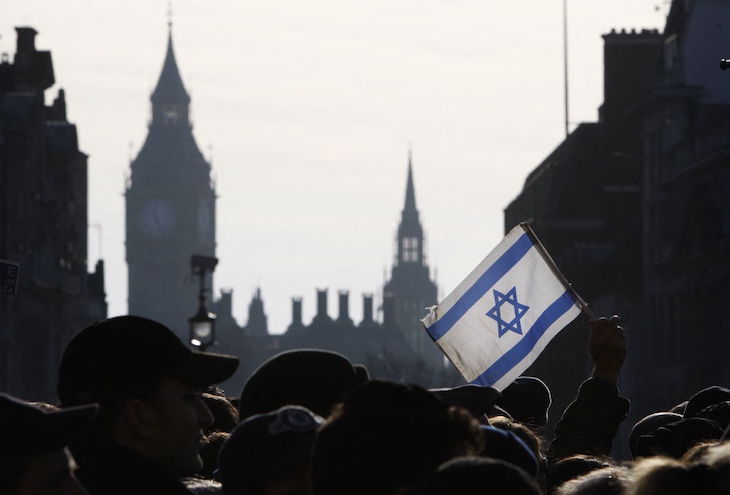Some things may come as no surprise in theory but cause the heart to sink when they emerge as reality. The surging number of British Jews emigrating to Israel – which doubled last year – is one such example.
With antisemitism at record levels, this exodus is hardly unexpected. The British Jewish community is longstanding and patriotic – the office of the Chief Rabbi was established in 1704 – and has always worn its warmth for Israel alongside a deep loyalty to King and country. This is not about to change. But relentless hostility takes a toll.
There is one particularly significant secret sauce that Israel offers
Before October 7, many British Jewish emigrants to Israel were 55 or older, with adult children and grandchildren and looking to enjoy their retirement overseas. The current surge, however, has mainly been among young families, professionals and academics, people who are observant enough to be, in the words of the Metropolitan Police, “openly Jewish”.
This cohort are the sort of people you want in your society. Highly educated, skilled, responsible and taxpaying, with solid family values, faith and a strong sense of social responsibility. These are the very people who looked at their future in Britain and decided that it would be worth uprooting their children to give them better lives in a country that is fighting a war on seven fronts.
For many Jews, the push-factors have become intense. Cases of damage to Jewish property rose by 246 per cent in the last six months of 2024, with threats against Jews rising by 158 per cent. In schools, antisemitic incidents were up by 119 per cent, and in universities by a staggering 465 per cent.
But there is more to this story than simply antisemitism. Remarkably, the Jewish state is one of the happiest countries in the world. Before October 7, it was fourth happiest, behind Finland, Denmark and Iceland; this year, after the nation was plunged into crisis, it fell just one place to fifth, being also overtaken by Sweden. Among the under-30s, Israel comes second. By comparison, Britain comes 20th.
By several important metrics, the Jewish state bucks the trend for the developed world. Its young people have no less access to social media than those in other democracies, yet their mental health is among the best on earth. Across all age groups, levels of crime, suicide, alcoholism and drug abuse are rock bottom. Israel’s rate of “deaths of despair” is among the lowest of OECD members, and its life expectancy is very high.
The demographic is unusually young – its average age is more than a decade lower than Europe – and the population is growing. This week, it was announced that it exceeded ten million for the first time, finally overtaking America as the largest concentration of Jews on Earth. Culturally, big families are seen as a sign of success, even in the secular high-tech sector, where children are regularly seen in the office.
Israeli tech is booming, leading the world in innovation. In recent years, it has ranked either first or second globally for the highest number of “unicorns” – privately-held startups worth more than $1 billion (£800 million) – per capita, competing with Singapore.
This is all very well. But Israel is a country at war, losing more people to terrorism and combat than at any other time in its history, in conditions of profound trauma. Its economy is under massive strain, with much of the workforce serving in uniform. In October, S+P Global Ratings lowered its long-term foreign and local currency sovereign credit ratings from A+ to A.
The collective anguish of October 7 and the continued plight of the hostages has hardly begun to be processed. The nation is riven by political crisis, with an ascendent far-right reaching for the levers of the state and bringing tens of thousands onto the streets in liberal cities.
Conscription means that the children of any new immigrant may very well have to put their lives on the line. Cost of living is extremely high, with many young people working two or even three jobs. Add to this the growing international hostility, seen in everything from arts boycotts to academic bigotry, and becoming Israeli means taking on quite the burden.
There is one particularly significant secret sauce that Israel offers, however. When I was there with my family last summer, my 14-year-old daughter put it best. “It feels like young people have a reason to live here,” she said. Despite the trauma and stress and danger, despite the hardship and ostracism and pain, the social bonds in Israel are deep and powerful.
Certainly among Jewish Israelis, everybody feels like family (which partly explains their attitudes towards queueing and arguing). Children live free-range lives, with strangers naturally looking out for them. Even those who are not religious join several generations every Friday night for dinner and an unusually large number of children are cared for regularly by their grandparents.
As Burke observed, these “little platoons” coalesce into a strong sense of patriotic identity, with the spirit of sacrifice for the family of the nation instilled from an early age. Ironically, perhaps, with the country under attack from all sides, this sense of togetherness has intensified. As antisemitism snowballs at home, British Jews feel a sense of this shared fate. It is, then, no surprise that rising numbers are deciding to decouple their personal stories from Britain and yoke them instead to the greater sweep of Jewish history.
The soaring antisemitism in Britain is tragedy enough. But perhaps the greater tragedy is that the secret sauce that Israel offers – the culture of service, solidarity and belonging that brings happiness to its people and gives them a reason to live – are precisely the things that our culture has been leaving behind.








Comments